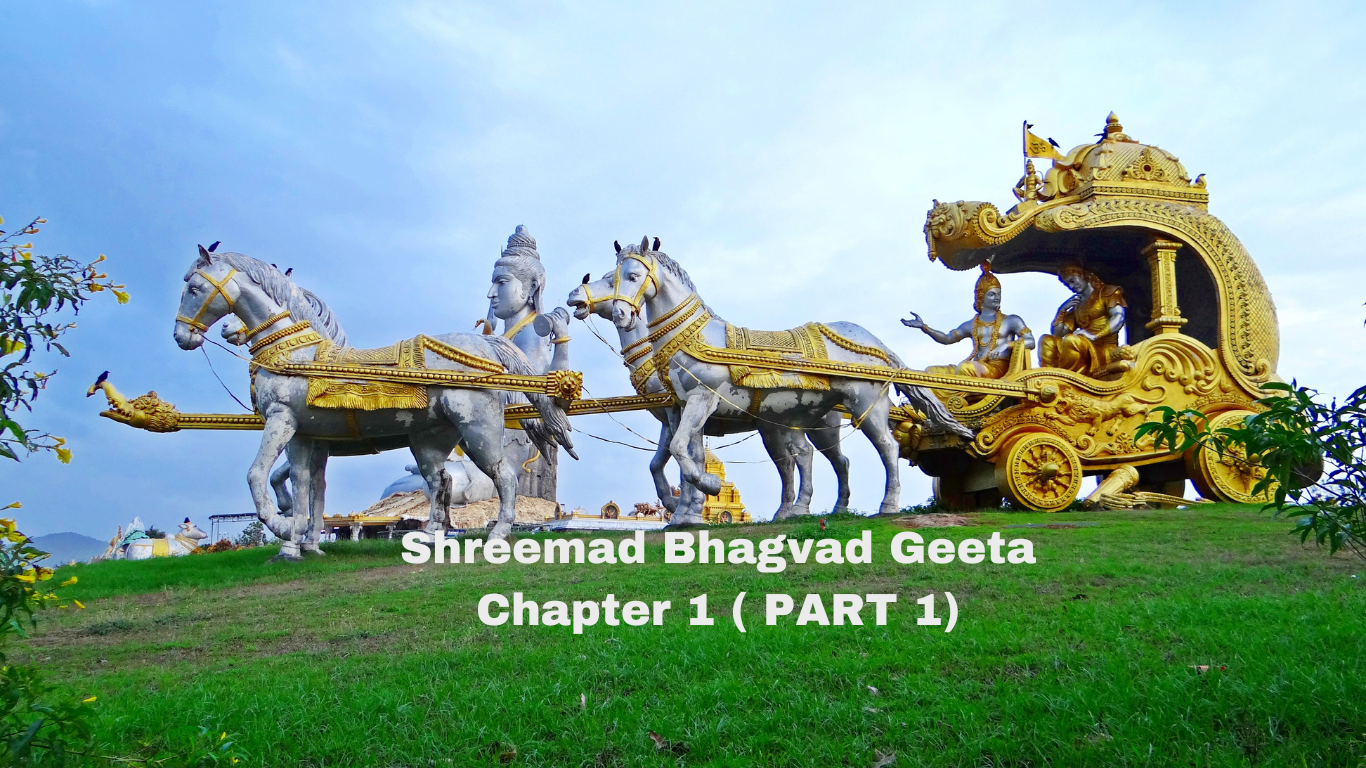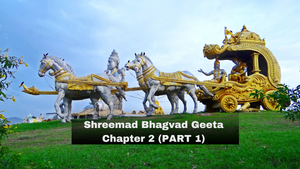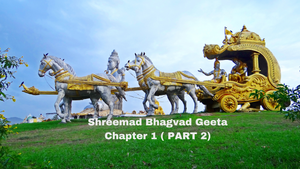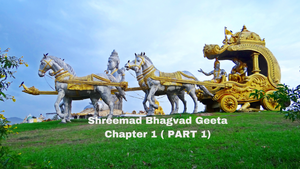
Are Emotions Really An Obstacle?
They say, 'Shreemad Bhagvad Geeta answers all your questions, no matter when you pick it, where you pick it, and how you pick it.'
Intrigued by this, I picked different versions of Geeta translated by different saints and authors. But, I really wanted someone who could explain it to me verbally.
And, because I wished for it, the Universe aligned me with a beautiful soul who recites and explains Shreemad Bhagvad Geeta based on pravachans of Param Pujya Gurudev Brahmleen Swami Subodhanandji based on the Shankaracharya Bhashya on Geeta.
That's how my learning of Shreemad Bhagvad Geeta began.
Before we begin, let’s sing the glory of Shreemad Bhagvad Geeta.
In our culture, before we study any scripture, we first recite its glory so that the divinity of the scripture comes alive.
Every faith can be divided into 4 parts -
- Ritualistic practices (Karamkaand & Upasana Kaand of Vedas)
- Literature (Mahabharata, Ramayana, Puranas)
- Timeline (Yug, Manavtar, Kalpa, etc)
- The philosophical part ( 6 Darshanas (6 School of Thoughts), Aranayaks & Upanishads)
It should be noted that the philosophical part is the core of the faith you follow.
But, when there are 6 Darshanas, more than 2000 Upanishads, and other scriptures that are extinct in today's world, we barely know how to study the philosophical part.
Krishna knew every bit of this. He knew that in Kaliyuga authentic Guru-disciple tradition would be extinct and people would be full of ignorance and laziness.
That’s how Govind found an amusing path to enlighten us with the glory of Shreemad Bhagvad Geeta i.e.the philosophical part only in 700 verses.
Isn’t his wit and humour praiseworthy enough?
Shree Adishankracharaya beautifully depicts the glory of Bhagvad Geeta in his own way where -
Upanishads = A Holy Cow
Krishna = Witty Shepherd/Milkman
Arjuna = Calf
The Upanishads all are like holy cows while Krishna is the milker and Arjuna is the calf. Here, the nectar in the form of milk is the crux Shreemad Bhagvad Geeta. While Krishna is the milkman who’s milking the holy cow to present the divinity and intellect of Geeta to the calf (Arjuna).
This explanation was given in the context of Krishna’s wit and mischievousness as he already knew that caste discrimination would be at its peak in Kaliyuga. People would be ignorant about the glory of the Vedas.
Therefore, the depiction of milk arises. Because everyone in every yuga has the right to drink milk. Meaning that you’re free to gain intellect and wisdom from this holy scripture - Shreemad Bhagvad Geeta irrespective of your gender, caste, religion, race, or tribe.
Furthermore, Sri Ved Vyas ji - the one who wrote all the scriptures himself says that Bhagvad Geeta is the text beyond all and above all, as it comes directly from Krishna.
To elaborate more on the glory of Shreemad Bhagvad Geeta, it’s also said that one may cleanse himself by bathing in the holy Ganga but if you bath yourself with the knowledge of Geeta, the dirt of material life will vanish forever from you, and your surroundings. This is why people who study Bhagvad Geeta are considered as fortunate devotees with their path lightened up towards a higher purpose.
Moreover, Vishnu himself takes refuge in Bhagvad Geeta and with its divine knowledge runs the Universe (Trilok).
To sum up and as it’s mentioned at the end of every chapter, Shreemad Bhagvad Geeta is the science of Brahman, Upanishads & Yog.
Before we begin, Please Note:
- Sanjay is Dhritarashtra’s charioteer and advisor.
- Ved Vyas ji is the famous saint who compiled the Vedas & Shastras.
- Arjuna is the son of Pandava and is proficient in archery.
- Duryodhana is the son of Dhritarashtra and he is skilled in fighting with mace/bludgeon.
- Bhishma Pitamah is the son of Devi Ganga. He is also the commander of Kauravas's army. He is the one who raised Kauravas and Pandavas.
- Guru Droncharaya is their teacher/mentor.
How The War Begins
To give you a reference, Dhritarashtra is born blind and is the father of Kauravas. While his sons are in the battle of Mahabharata, he is anxious to know what’s happening on the battlefield after Bhishma Pitama (the greatest of all the warriors dies). This is why, he asks Sanjay about the happenings of the war on the 10th day of the battle when Bhishma is no more. For fulfilling this purpose, Ved Vyas ji provides the opportunity of divine sight (Divya Drishthi) to Sanjay so that he could recite the war of Mahabharata to Dhritarashtra right from the start.
In the first few verses, Sanjay is explaining everything about the teams, their opponents, the rules of the war, and so on as described by Duryodhana.
10th Verse
Duryodhana goes to his Guru and explains everything about the opponent team, all the material things like weapons, horses, chariots, strengths, and weaknesses. He also proudly states that it’s impossible for the Pandavas to win the war. Pandavas army was 7 Akshoni while Kauravas had 11 Akshoni army. Also, Bhishma Pitama had blessings of wishful death from his father Shantanu, that’s why Duryodhana was over-excited for the war.
Duryodhana was overconfident because he had Krishna’s Narayani Sena too which made him think that nobody can beat him in the war. Duryodhana’s pride, greed, lust, anger, etc never made him identify the creator himself. Because of these lower negative traits, he considered Krishna as a human being.
The Crux - One can never identify the truth even if the truth itself comes in front of them if the lower negative traits are present in them. This is why the main aim of SPIRITUALITY is to cleanse the mind, intellect, memory, and ego in order to realize your SELF (Atman).
14th Verse
Sanjay describes the beautiful chariot of the great warrior Arjuna who’s the most proficient star of archery among the Pandavas. Krishna is his chariot and the red flag on the chariot depicts the powerful Hanumanji.
20th Verse
Arjuna asks Krishna to take his chariot in the no man’s land (in the middle of both the opponent teams) so that he could see how many people are supporting Duryodhana in his adharma/evilness.
25th Verse
Gopala never fails to mesmerize us with his wittiness. On being asked by Arjuna, he intentionally brings his chariot before the Bhishma Pitama and Guru Dronacharya, Arjuna’s loved ones. He did this intentionally because he knew about Arjuna’s attachment to these two.
The Crux - Krishna strategically arranges this situation so that Arjuna is overwhelmed and he could give the message of Geeta to the world. Aren’t Krishna’s strategic skills praiseworthy?
26th Verse
As soon as Arjuna starts looking at all his family members in the opponent team, especially Bhishma Pitamah and Guru Dronacharya, he is crippled by his emotions. This is the turning point of the 1st Adhyaya where the situation totally turns against the war because Arjuna becomes overwhelmed by emotions like attachment, grief, and compassion.
Hey Krishna, I’m surrounded by grief and compassion. Is this dharma or adharma? I’m unable to understand. I can’t do this.
Such an expression comes from Arjuna, who’s an all-time powerful warrior, and that too when the war is about to start. He wanted Krishna to place his chariot in the no man’s land to observe and analyze the situation of the war, while his emotions totally take him the other way around.
The Crux: The point to be understood here is that it’s good to have compassion in our hearts. But, if the same compassion destructs your wisdom or conscience, then it’s of no use.
The War of Mahabharata wasn’t a petty issue. It was decided to go for the war after many uncomfortable conversations and scenarios between Kauravas and Pandavas. Even, Krishna tried to pacify the Kauravas by asking them to make a pact with Pandavas, even then Kauravas were too adamant and full of pride. That’s again a different story. Let’s stick to the current one.
The battle of Mahabharata was the battle for making a way of Dharma in the society. It was well-thought and planned already, so all the emotions that Arjuna was feeling right now, was it justified? Were his emotions in the right place? Were his emotions deviating him from the purpose?
Undoubtedly, emotions play a very important role in our lives and if suppressed they enter our lives in the form of physical diseases. Whether it’s your intuition, gut feeling, natural instincts, everything is important. All the emotions are.
But, when the same emotions try to deviate you from the purpose of your life or any of the goals that you’ve set for yourself, they might be harmful. This is why, it’s important to understand the thin line where emotions could go wrong in our lives.
Sometimes, we are so overwhelmed that we are not able to see any good in the situation and take wrong decisions. For instance, we usually make wrong decisions when we are angry.
That’s how Arjuna was deviating from his purpose due to his emotions of cowardly compassion, grief, attachment, and sadness. So, what do you think? Are emotions really an obstacle?
What's your take on this?
Join me in the mission - Let's understand Geeta together :)



